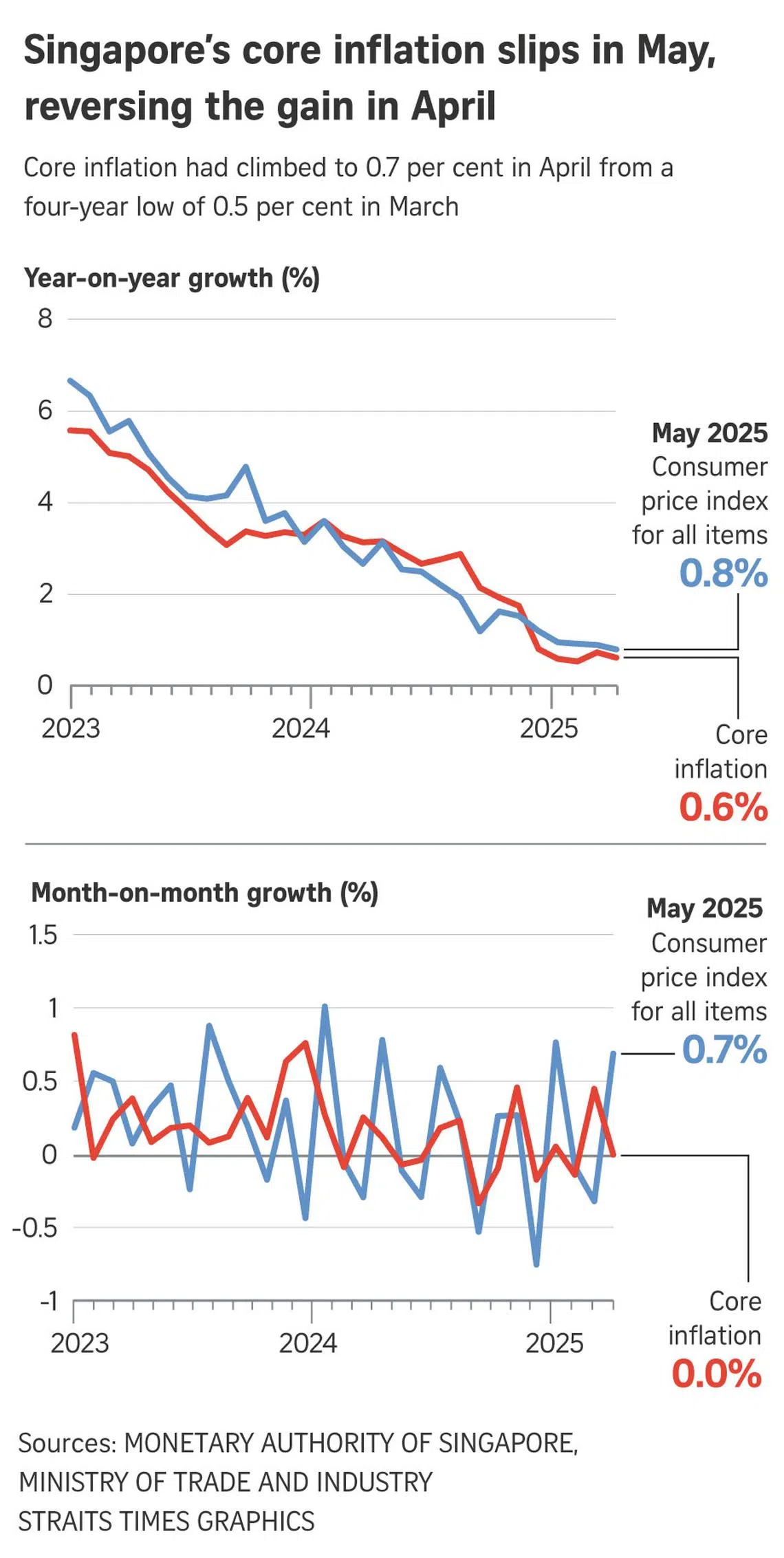Singapore core inflation dips in May but analysts say may pick up on escalating Middle East conflict
Sign up now: Get ST's newsletters delivered to your inbox

Overall inflation edged lower to 0.8 per cent year on year in May, due mainly to smaller increases in the prices of food and private transport.
PHOTO: ST FILE
Follow topic:
SINGAPORE – Singapore’s core inflation dipped in May, reversing the increase in April, but economists said consumer prices may rise at a faster pace as tensions in the Middle East escalate after the US entered the conflict
Core inflation edged down to 0.6 per cent year on year in May. It had climbed to 0.7 per cent in April from a four-year low of 0.5 per cent in March, snapping six straight months of year-on-year declines.
The drop-back in core inflation in May was driven mainly by lower food inflation, the Monetary Authority of Singapore (MAS) and Ministry of Trade and Industry (MTI) said in their joint report on June 23.
Core inflation excludes private transport and accommodation costs to better reflect the expenses of households here.
Both core and overall inflation readings in May were in line with forecasts by economists in a Bloomberg poll.
Overall – or headline – inflation edged lower to 0.8 per cent year on year in May, from 0.9 per cent in April. This was due mainly to smaller increases in the prices of food and private transport.
MAS and MTI left unchanged their forecasts for core and overall inflation to average 0.5 per cent to 1.5 per cent in 2025, but they said that “the uncertainties to inflation have risen amid the increased risks in the external environment”. The ministries had said in May that risks to inflation were “tilted towards the downside”.
Market watchers are staying alert to potential flashpoints. Iran has threatened to shut down the Strait of Hormuz
Ms Charu Chanana, chief investment strategist at Saxo, said that Tehran does not need to shut it down completely, but the threat that it could do so is enough to heighten fears that oil supply will be disrupted. That will lift energy prices and fuel inflation concerns, she said.
Furthermore, heightened tensions will lead to higher shipping costs and insurance premiums for ships travelling through Hormuz, Ms Chanana said.
DBS Bank senior economist Chua Han Teng said the rising global crude oil prices could translate into higher energy import prices for Singapore. He added that there will be ramifications on electricity and travel-related costs.
For now, DBS said inflation remains subdued thus far in 2025 and the bank’s outlook anticipates benign price pressures.
UOB associate economist Jester Koh said that higher oil prices could have a spillover impact on electricity, gas, petrol, point-to-point transport services, airfares, transport services of goods, and bus and train fares.
Mr Koh added that UOB’s sensitivity analysis suggests that core inflation could rise by 0.05 percentage point to 0.06 percentage point for every US$1 a barrel increase in Brent crude oil prices.

The situation remains fluid though.
Mr Heng Koon How, head of markets strategy at UOB, noted that Saudi Arabia and the other members of Opec+, which includes the Organisation of Petroleum Exporting Countries (Opec) and non-Opec oil-producing countries like Russia and Malaysia, have “lots of room to pump more oil and are likely motivated to return more of the production cuts” that were implemented since late 2022.
Moreover, China and the Organisation for Economic Co-operation and Development member countries, which include the US, Australia, Germany, Japan and South Korea, have built up substantial crude oil stockpiles, he added. All these, he said, meant any potential disruption and loss of crude oil supply from Iran can in theory be absorbed.
MAS and MTI in their report on June 23 said that Singapore’s imported inflation should remain moderate. They added that while global crude oil prices have risen in recent weeks, oil prices remain close to the average in 2024. Food commodity price increases should also remain contained, they added.
Although trade conflicts and the rise in global energy prices could be inflationary for some economies, their impact on Singapore’s import prices is likely to be offset by the disinflationary drags from weaker global demand, the ministries said.
At home, MAS and MTI project that nominal wage growth will continue to ease, even as productivity increases.
Enhanced government subsidies for essential services such as public healthcare, pre-school education and public transport will also continue to dampen services inflation, they added.
May’s inflation report showed that food inflation eased to 1.1 per cent as the prices of non-cooked food rose at a slower pace, while private transport inflation slowed on the back of a smaller increase in car prices.
Other categories registered either a further decline in prices or no change in prices. Electricity and gas inflation fell further to minus 3.7 per cent due to a larger decline in electricity prices. Prices of retail and other goods continued to fall, albeit at a slower pace of 1 per cent compared with April’s 1.2 per cent.
Services inflation was unchanged at 1.1 per cent as a larger increase in the costs of point-to-point transport services and health insurance offset a steeper decline in holiday expenses.
Accommodation inflation was also unchanged at 1.1 per cent as a smaller increase in housing rents was offset by a larger increase in the cost of housing maintenance and repairs.


